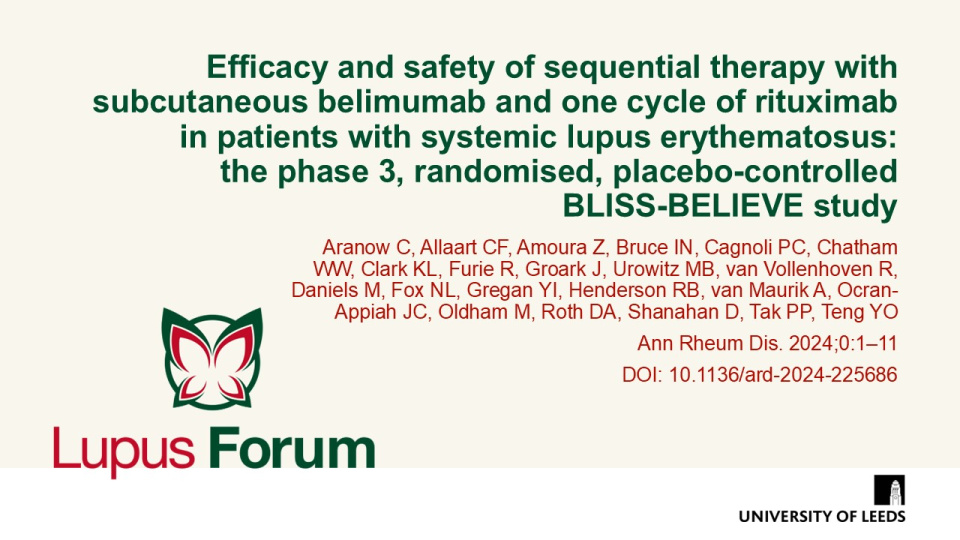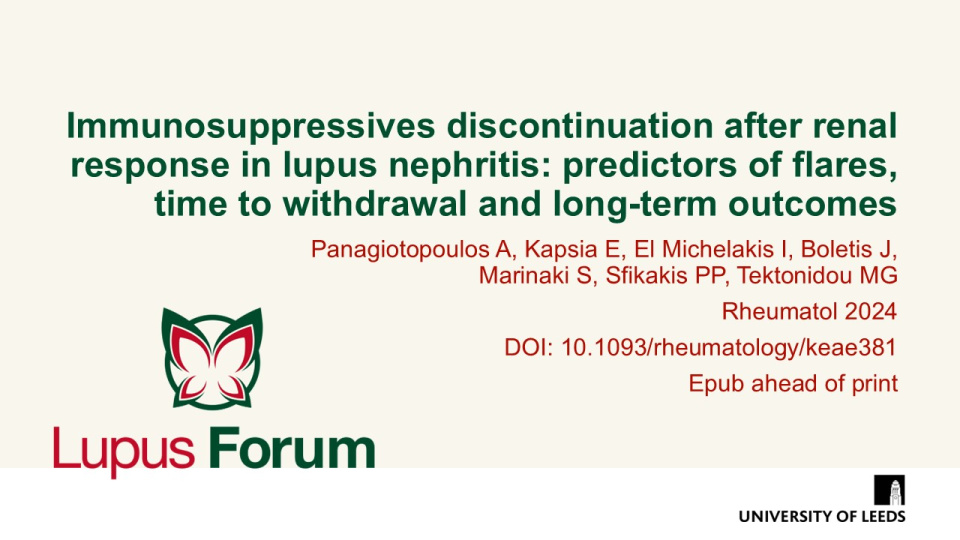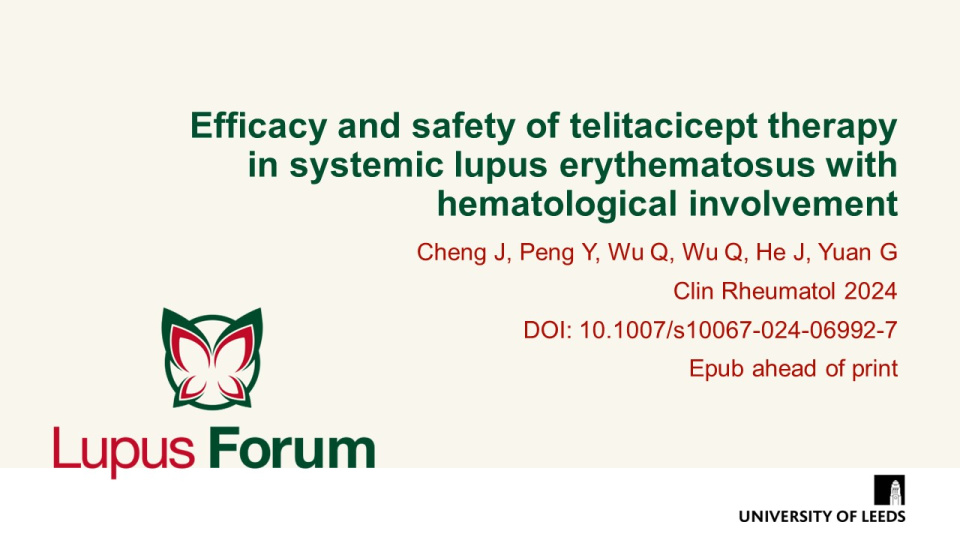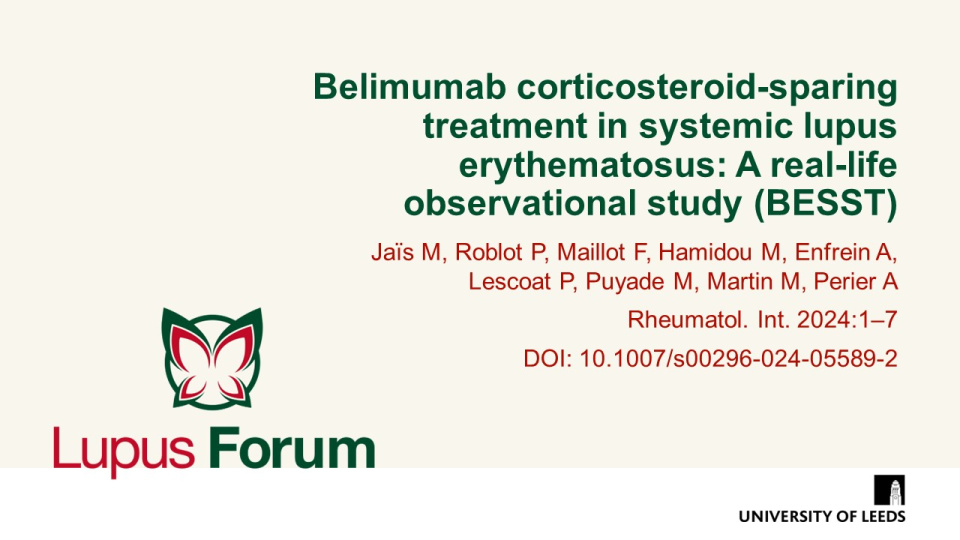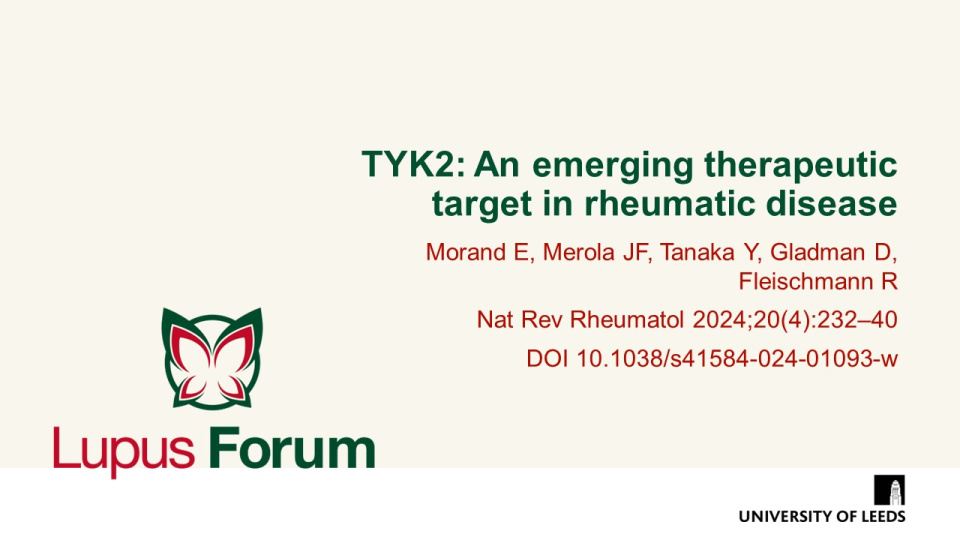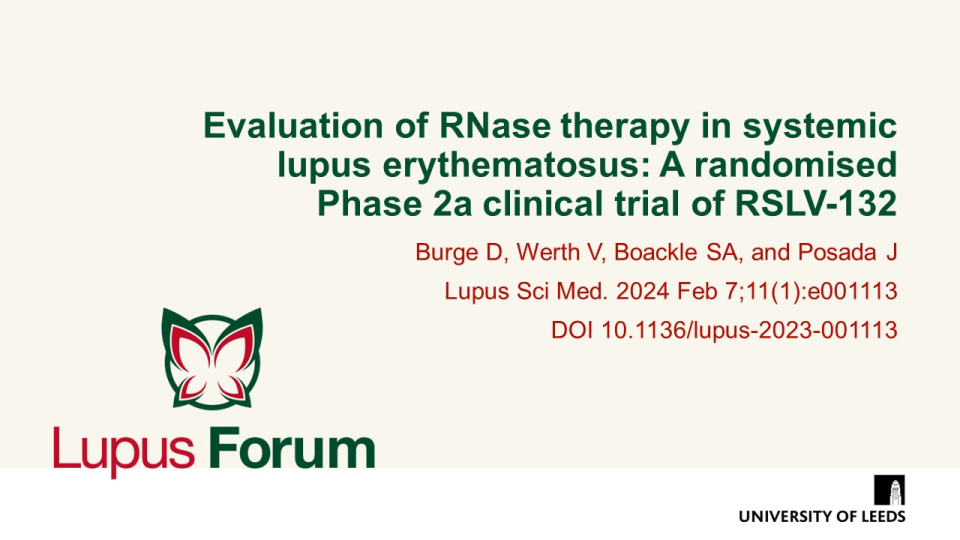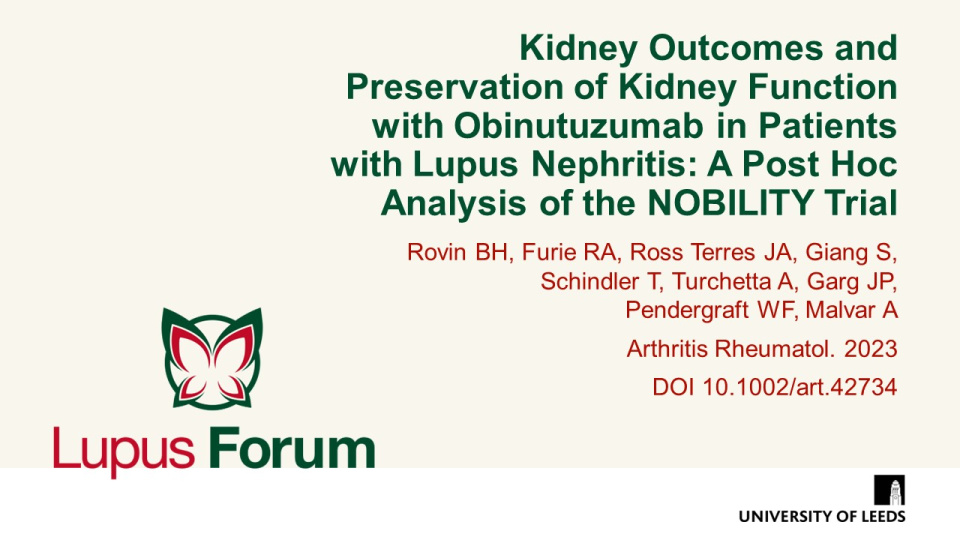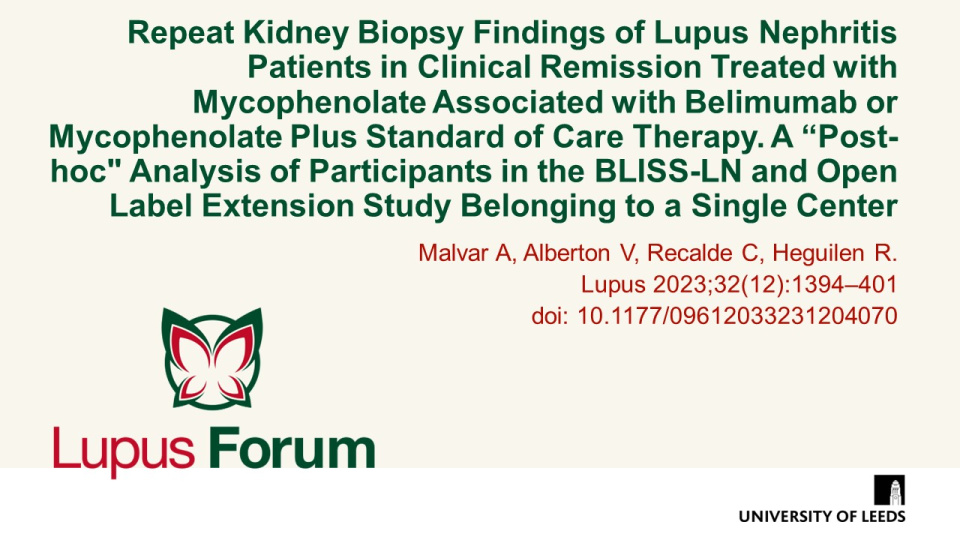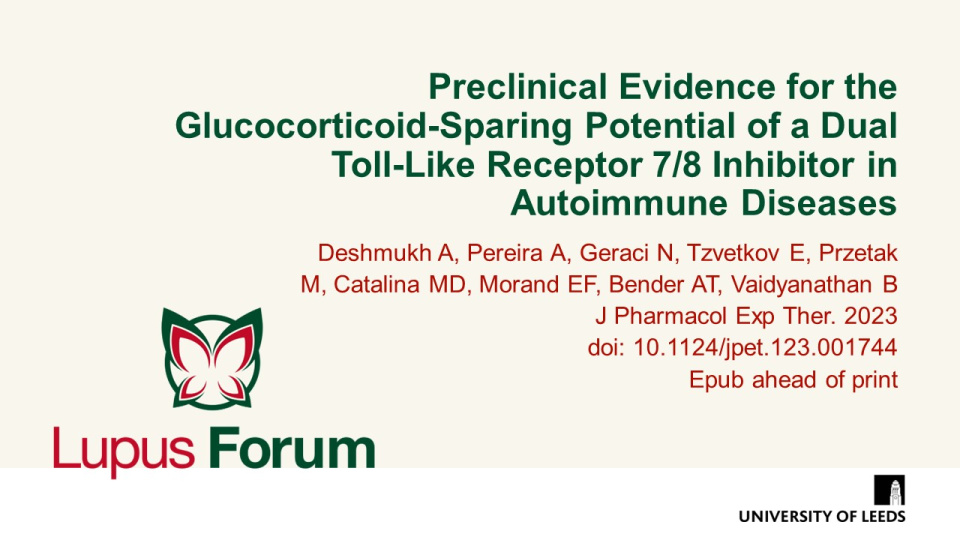Publications
Find coverage of the latest original articles on Lupus, focusing on those with data on therapeutic interventions and those that have clinical impact.
Efficacy and safety of sequential therapy with subcutaneous belimumab and one cycle of rituximab in patients with systemic lupus erythematosus: the phase 3, randomised, placebo-controlled BLISS-BELIEVE study
Ann Rheum Dis 2024;0:1–11 DOI 10.1136/ard-2024-225686.
Aranow et al. evaluated the efficacy and safety of combining subcutaneous belimumab with one cycle of rituximab in SLE. Sequential therapy did not show a statistically significant improvement in disease control over belimumab monotherapy, but did achieve nominally better reductions in disease activity markers.
Keywords:
Immunosuppressives discontinuation after renal response in lupus nephritis: predictors of flares, time to withdrawal and long-term outcomes
Rheumatol 2024 DOI 10.1093/rheumatology/keae381 Epub ahead of print
This study by Panagiotopoulos, et al. showed that an early complete renal response achievement, persistent hydroxychloroquine use, and the maintenance of optimal low disease activity during follow-up in immunosuppressive (IS) tapering and discontinuation are fundamental in LN treatment. The authors also found that long-term renal outcomes are mainly associated with renal flares during IS tapering.
Efficacy and safety of telitacicept therapy in systemic lupus erythematosus with hematological involvement
Clin Rheumatol. 2024 May 20 doi: 10.1007/s10067-024-06992-7. Epub ahead of print
This real-world combination of telitacicept and standard treatment demonstrated significant improvements in anaemia, as well as increased leukocyte and platelet levels in patients with SLE and haematological involvement. Here, investigators sought to evaluate the efficacy and safety of telitacicept in combination with standard treatment in SLE patients specifically with haematological involvement.
Keywords:
Belimumab Corticosteroid‑Sparing Treatment in Systemic Lupus Erythematosus: a Real‑Life Observational Study (BESST)
Rheumatol. Int. 2024 Apr 30:1–7 DOI: 10.1007/s00296-024-05589-2 https://pubmed.ncbi.nlm.nih.gov/38687385/
Belimumab confers an early and sustained corticosteroid-sparing effect after 3 months of treatment in SLE patients. This was demonstrated by a significant prednisone dose reduction that continued through months 6 and 12, and was sustained until month 24.
TYK2: An emerging therapeutic target in rheumatic disease
Nat Rev Rheumatol 2024;20(4):232–40 DOI 10.1038/s41584-024-01093-w
TYK2 inhibitors hold promise for the treatment of a distinct spectrum of autoimmune diseases, including SLE, and could potentially have a safety profile that differs from other JAK inhibitors.
Evaluation of RNase Therapy in Systemic Lupus Erythematosus: A Randomised Phase 2a Clinical Trial of RSLV-132
Lupus Sci Med. 2024;11:e001113 DOI 10.1136/lupus-2023-001113
Treatment with RSLV-132 was associated with lower rates of SAEs than placebo, although RSLV-132 therapy was not associated with a significant improvement in the mean CLASI score relative to placebo. However, results suggest that further evaluations of RSLV-132 in SLE should be undertaken with patients with more active disease who are most likely to benefit from RNase therapy.
Kidney Outcomes and Preservation of Kidney Function with Obinutuzumab in Patients with Lupus Nephritis: A Post Hoc Analysis of the NOBILITY Trial
Arthritis Rheumatol. 2023 DOI 10.1002/art.42734
This post hoc analysis of the Phase 2 NOBILITY trial determined that obinutuzumab plus standard of care improved the likelihood of long-term preservation of kidney function and improved kidney function with less glucocorticoid use in patients with lupus nephritis.
Keywords:
Emerging Immunotherapeutic Strategies for Cutaneous Lupus Erythematosus: An Overview of Recent Phase 2 and 3 Clinical Trials
Expert Opin Emerg Drugs 2023;28(4):257–73 DOI: 10.1080/14728214.2023.2273536
Current treatments for refractory CLE are insufficient, often leading to suboptimal disease control, and demanding escalated therapies associated with systemic toxicities. However, recent Phase 2 & 3 trials offer promising results, suggesting new therapeutics approved for CLE are on the horizon.
Repeat Kidney Biopsy Findings of Lupus Nephritis Patients in Clinical Remission Treated with Mycophenolate Associated with Belimumab or Mycophenolate Plus Standard of Care Therapy. A “Post-hoc" Analysis of Participants in the BLISS-LN and Open Label Extension Study Belonging to a Single Center
doi: 10.1177/09612033231204070 Epub ahead of print
Single-centre study concludes that adding belimumab to the standard of care treatment with mycophenolate (MMF) increases the possibility of achieving a complete clinical response (CCR), complete histological response (CHR), and a lower rate of relapses during treatment and long follow-up.
Preclinical Evidence for the Glucocorticoid-Sparing Potential of a Dual Toll-Like Receptor 7/8 Inhibitor in Autoimmune Diseases
J Pharmacol Exp Ther. 2023 doi: 10.1124/jpet.123.001744 Epub ahead of print
Preclinical evidence indicates a glucocorticoid (GC)-sparing potential for toll-like receptor (TLR)7/8 inhibitor compounds, suggesting TLR7/8i may offer a new strategy for the treatment of autoimmune diseases.


